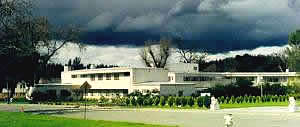 |
|
Developing Virtue School Commencement Speech
From the June 1997 issue of Vajra Bodhi Sea
By Frank Lin, age 17Time passed by so quickly. It has been six years already, but I feel as if I only arrived here yesterday…
Venerable Master, the Principal, Dharma Masters, teachers, parents, and fellow students, good evening! I came to this school in 1991 because my parents wanted to instill goodness in me and help me develop virtue. As a eleven-year-old boy, I did not understand why I had come to the City of Ten Thousand Buddhas. This school was definitely different from public schools. Before I came up to this school, I didn’t study hard; I watched TV and played whenever I could. At the City of Ten Thousand Buddhas, I wasn’t allowed to watch television; besides studying, I would play on the grounds with other students. But the daily schedule at the City of Ten Thousand Buddhas kept me busy. Time passed by so quickly. It has been six years already, but I feel as if I only arrived here yesterday.
In addition to English and maths, our school taught Virtue Studies, Buddhist Studies, and meditation. Just learning about virtues and Buddhism wasn’t enough. We had to put these concepts into action. I learned to apply virtues such as honesty, loyalty, a sense of shame, and respect in the classroom and benefited greatly from it. The most important thing I learned from teachers and fellow students was that human relations and communication are very important. People should get along and try to learn from each other.
We can learn many things in school and from teachers, as well as from our fellow students—the people we hang around often. We can be easily influenced in both good and bad ways by our friends. Venerable Master Hua, the founder of our schools, said that people should learn what is good from others and be aware of what is bad of others in order to correct ourselves. This guiding principle has taught me to appreciate the good qualities in other students and change my own bad habits. I must say that some of my schoolmates have been excellent role models for me and many others. I have striven to emulate their qualities of being good students and friendly people. It is hard to find friends with such qualities outside; that is why our school is special.
There’s a thoughtful poem titled “Listening to the Rain” which I would like to share with everyone.
During my youth, I listened to the rain from within a teahouse,
I rested under a silken canopy bed shadowed by dimly lit red candles.
During my adulthood, I listened to the rain from within a boat away from home.
The clouds were thick, the river was wide,
and a long wild goose cried out against the Autumn wind.
And now I’m listening to the rain from under the eaves of a monastery.
Silver gray speckles upon my head.
Happiness and sadness, meeting and departing,
are all meaningless.
Let the rain continuously drip just as meaninglessly until dawn.The reason I bring up this poem is because it shows how everything is impermanent. The pet wasted his young life on enjoyment and fell into sorrow and hardship when he grew older. Finally, in his old age, he learned to accord with conditions without changing his principle. I’ve already learned this at such a young age. That is why I feel very lucky to be able to attend Instilling Goodness and Developing Virtue Schools and to receive Master Hua’s guidance.
I want to thank all my teachers and fellow students for helping me become a better person. Most of all, I want to thank my parents for giving me the opportunity to come to this school. I now have a better understanding of why I should come to CTTB. Parents know what is best for you; it’s really true! I want to thank Venerable Master Hua, all teachers, parents and fellow students again for their guidance and support.

